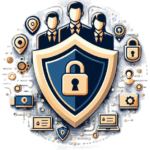Cybersecurity Tip of the Day
Welcome to our cybersecurity briefing. Here, we equip you with essential cybersecurity knowledge to fortify your digital presence. Our tips are concise, actionable, and tailored for everyone from IT experts to digital newcomers. Enhance your defenses and ensure your online interactions remain secure.
Use strong passwords and a password manager
A strong password is a combination of lower- and upper-case letters, numbers, and special characters. A password manager can help you store and generate strong passwords for different accounts. This way, you can protect yourself from brute force attacks and password guessing.

Be mindful of phishing emails
Another way to protect your online accounts is by being careful with phishing emails. Phishing emails are fraudulent messages that pretend to be from legitimate sources, such as your bank, your employer, or a popular website. They often ask you to click on a link, open an attachment, or provide your personal or financial information. However, these links and attachments can contain malware that can infect your device or steal your data. The information you provide can also be used to access your accounts or commit identity theft. To avoid phishing emails, you should always check the sender’s address, the subject line, and the content of the message for any signs of inconsistency, urgency, or errors. You should also never click on any links or attachments that you are not expecting or that look suspicious. Ultimately, organizations should invest phishing email simulation tools to ensure their employees can spot phishing threats when they see them.
Ensure your employees are up to the task of identifying phishing emails.
Regularly Update Operating Systems & Software
Regular updates of Operating Systems and software applications are crucial for businesses because they patch security vulnerabilities that could be exploited by cybercriminals. These updates often include fixes for security flaws that, if left unaddressed, could lead to data breaches, loss of customer trust, and financial damage. By staying current with updates, businesses can protect against the latest threats and ensure the integrity and confidentiality of their data. Additionally, updates can improve software performance and compatibility, contributing to overall operational efficiency. In essence, regular updates are a key component of a robust cybersecurity strategy, helping to safeguard a business’s digital assets against evolving cyber threats.
Avoid Use of Public Wi-Fi
Using public Wi-Fi poses significant risks to your data security. Here’s why:
Man-in-the-Middle Attacks (MITM): Public Wi-Fi networks are vulnerable to MITM attacks. In these attacks, an eavesdropper intercepts data transmitted between your device and the internet. Sensitive information you thought was private becomes exposed.
Unencrypted Networks: Most public Wi-Fi networks lack encryption. Without encryption, your web traffic is easily accessible to hackers. Even if a network claims to be encrypted, it’s challenging to verify its security.
Malware Distribution: Attackers can exploit software vulnerabilities to inject malware onto your device without your knowledge. Connecting to unsecured Wi-Fi increases the risk of malware infiltration.
Wi-Fi Snooping and Sniffing: Cybercriminals can snoop on your online activities while you’re connected to public Wi-Fi. They may intercept sensitive documents, including confidential contracts and financial information.
For your protection, disable the Wi-Fi AutoConnect features on your mobile device. Additionally, if internet use is required connect to your mobile device’s hotspot instead of using a Public Wi-Fi.








